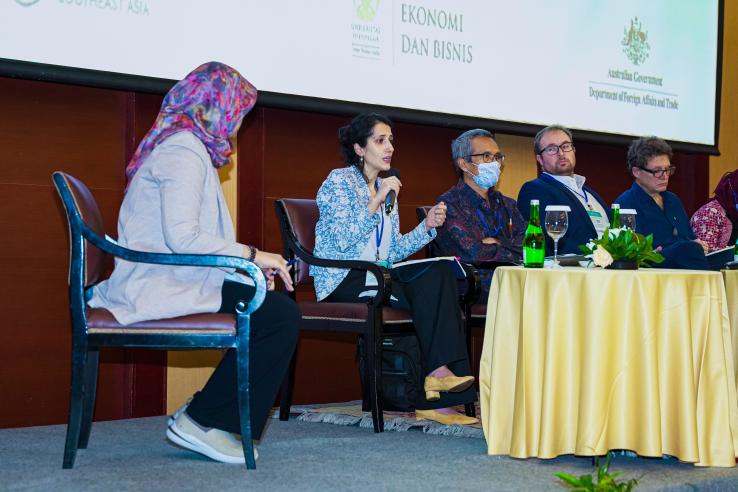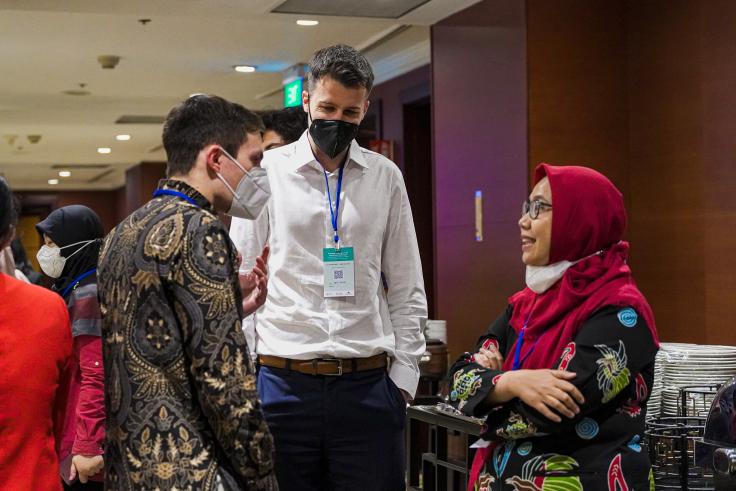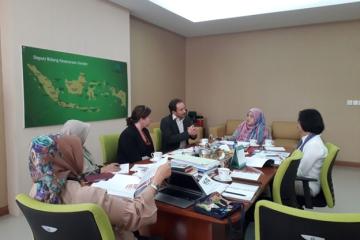
Understanding environmental challenges in Indonesia: The importance of collaboration, evidence, and context

From left: Alin Halimatussadiah, Namrata Kala, Sudarno Sumarto, Ryan Edwards, Robin Burgess
To further support the important work by the Government of Indonesia (GoI) to build climate resilience and a sustainable environment, J-PAL Southeast Asia held a conference on October 25, 2022, to bring together policymakers and practitioners in the field. The conference shared insights from rigorous evidence that is aimed to support the efforts to increase climate mitigation and adaptation in Indonesia.
Like many countries across the globe, climate change increasingly poses a risk to the socioeconomic development of Indonesia. The consequences are disproportionately affecting people living in poverty. For example, extreme weather events have made agricultural and fishery activities more susceptible to failure, threatening food security and livelihoods. To help the nation mitigate and adapt to the effects of climate change, the GoI has set a target to reduce greenhouse gas emissions by 31.89 percent by 2030 and began the development of innovative policies, such as mangrove ecosystem restoration and community forest management. The government also made commitments to reduce the use of coal and oil and move towards sustainable energy sources.
The conference connected over 130 participants from government agencies, research and academic institutions, and nonprofit organizations (NGOs) to foster collaboration in seeking solutions to climate change. Attendees had the opportunity to hear opening remarks from two government officials. H.E. Nadiem Anwar Makarim (Minister of Education, Culture, Research, and Technology, Government of Indonesia) highlighted the importance of equipping Indonesian youth with the knowledge to combat the effects of climate change through education, while Ir. Sigit Reliantoro (Director General of Environmental Pollution and Degradation Control, Ministry of Environment and Forestry) emphasized that the key to sustainable development is making sure the goals are in tandem with environmental needs.
“Climate change is a crisis that we have to face together. We need a systemic socioeconomic transformation that puts forward our relationship with the environment to create harmony between development and environment.” — Ir. Sigit Reliantoro
Following the remarks, researchers, policymakers, and participants shared valuable insights on some of the most prominent themes when addressing Indonesia’s environmental challenges: forests and marine ecosystems, sustainable energy, air pollution, and urban transport.
Below are key takeaways from the conference:

Photo: Anemone Studio
1. Collaboration across sectors is key to addressing climate challenges
As the number of conversations surrounding the urgency of addressing climate change grows, so too are the efforts of policymakers, academics, and practitioners. Collaboration is essential given the involvement of many stakeholders. As highlighted by H.E. Nadiem Anwar Makarim in his opening remarks, “Stakeholders from different sectors must be involved in the discussion of tackling environmental challenges in order to have more comprehensive discussions and produce strategic solutions.”
In this regard, all sectors play an important role in addressing climate change. For example, while the government works to create policies and regulations to promote environmental sustainability and incentives to improve people’s access to climate change mitigation and adaptation programs, the private sector can invest in innovative technology and new disruptive business models. Academics, on the other hand, can help fill knowledge gaps on the real-world impacts of climate solutions through research. Conferences, such as this one, can be effective means to encourage collaboration among key stakeholders, build connections, and exchange knowledge that could help to provide solutions for improving environmental sustainability.
2. Data and evidence are needed for effective policies
Randomized evaluation is one of the methods that can be used to measure policy impact and generate rigorous evidence. Having reliable and accurate insights are particularly important to inform new policies or improve existing programs.
Zooming into the issue of deforestation, one policy approach to reducing forest burning is to provide payments for ecosystem services (PES), where individuals are paid to refrain from environmentally damaging behavior. An impact evaluation in Uganda showed that implementing PES can be an effective way to conserve forests. Nevertheless, when it comes to implementing PES in Indonesia, more research is needed. During the conference, Benjamin Olken (Scientific Director, J-PAL SEA) highlighted the importance of identifying the best way to design the policy to ensure its effectiveness.
Overall, employing research is key to supporting evidence-based policymaking. Evidence is especially valuable given that there are new innovative policies that Indonesia is exploring in response to climate change issues, such as emission monitoring systems, vehicle emission testing, and the development of an electric vehicle ecosystem.
3. Solutions should factor in the local context
Speakers and participants at the conference discussed different policy solutions that have been implemented globally to address different environmental challenges, such as the use of prepaid meters to reduce electricity consumption or the adoption of electric vehicles to cut air pollution. However, when adopting policies from other countries, it is important to take into account the local context. This includes weighing in not only the location, but also how the local condition, the general behavior of the communities, and the implementation capacity would look like in the new setting.
Take fossil fuel alternatives as an example. While the use of electric vehicles can be a solution to air pollution and has been adopted by several countries, participants at the conference pointed out that paying attention to the main energy source is crucial when pushing for its development. Policies related to the use of electric vehicles need to be aligned with local challenges, such as capacity constraints, to ensure that the solution meets local needs.
Way forward: Building an evidence base for the environment sector
Generating evidence to tackle climate change issues is an essential step towards a more resilient future. Supporting the wider adoption of rigorous evidence into policy and program formulation is essential, and can help policymakers and practitioners better understand the nexus between the environment and other sectors, such as gender, health, labor markets, and finance. As it becomes more pressing for Indonesia to adopt effective climate change mitigation and adaptation strategies, J-PAL looks to further support the work of academic researchers and policymakers by facilitating more government partnerships and generating more evidence to inform climate policy and programming.
Related Content

Testing the Effectiveness of Payments for Ecosystem Services to Enhance Conservation in Uganda

How can we best conserve the Amazon? Open policy questions for randomized evaluations


